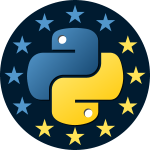EuroPython 2021 will again have training sessions and workshops! They will take place on the Training and Workshops Days: Monday & Tuesday, July 26 & 27th 2021.
In total, we have carefully curated 14 paid training sessions, which you can attend with a Combined Ticket. Each session will be 3 hour long.
If you have purchased a Conference only Ticket, you are still welcome to join the sponsored workshops in the Argument-Clinic track!
If you are a total beginner, we teamed up with Humble Data to deliver Beginners' Day Workshop, specifically for newcomers to the Python programming language, also accessible for Conference only Ticket holders.
Trainings & Workshops
Accessible with a Combined Ticket
Build a deep learning-powered image search system with Jina + BigTransfer (BiT)


Cristian Mitroi & Maximilian Werk
The deep learning technology provides a good base to neural search. However, building a neural search system is non-trivial for researchers and engineers without a good understanding of both search pipelines and deep learning models.
In this workshop, we will show you step by step how you can make use of Jina (open source neural search framework) + BigTransfer to build a neural search system that performs image-to-image search in an easier way.
Building a practical Slack bot with Python & FastAPI

Slack is a great tool for team comms, and sometimes, we want to fit our existing company workflows in it.
In this training, we’ll explore:
- How to handle bot mentions and replies, using FastAPI.
- How to talk back with Slack.
- How to test your bot so you can make sure everything works smoothly.
- How to have some fun implementing the different bot behaviors!
Goals of this training:
- Show how to easily spin your own Slack bot with Python!
- Explore FastAPI along the way.
Climate data analysis with xarray and cartopy

This tutorial aims to introduce audience with climate data analysis using Python libraries xarray and cartopy. The goal of the tutorial is to provide participants with basic skills for climate data analysis.
Creating 2D Applications and Games
Do you want to create fancy 2D dashboards for streaming or know how to create games? Then this tutorial is the best way to get started.
This tutorial is based on the arcade module.
Arcade can be used to create 2D applications and runs on many platforms, including Raspberry Pi.
We start using basic drawing commands and go on to drawing images, interact with mouse, keyboard or even a game controller.
Then we create two sample applications together.
Data Analysis with pandas - Workshop
This is a hands-on workshop to help the audience getting familiar with pandas, one of the main Python libraries for data analytics.
This workshop will showcase code examples using pandas to perform operations such as inspect, summarise, select, filter, transform, sort, aggregate and plot your data, and will provide exercises that you can use to consolidate your new knowledge.
Docker for Machine Learning Engineers

This presentation is divided into the following sections:
Working with images
Working with containers
Working with Docker files
Demo of using Docker with machine learning and computer vision projects.
GPU development with Python 101

Writing GPU code in Python is easier today than ever, and in this tutorial, we will cover how you can get started with accelerating your code.
You don't need to learn C++ and you don't need new development tools.
Attendees will be expected to have a general knowledge of Python and programming concepts, but no GPU experience will be necessary. Our key takeaway for attendees will be the knowledge that they don’t have to do much differently to get their code running on a GPU.
Implementing a Neural Network from Scratch

The fact that you can just install a library and train machine learning models straight away is amazing, to say the least.
However, if your purpose is to learn how the models work, writing `import pytorch` will not do much for you.
In this hands-on workshop we implement a basic neural network framework, dealing with all the nitty-gritty details, and making sure you build something amazing in a surprisingly short amount of code. We also apply our framework to a real classification problem.
Introduction to Property-Based Testing
Tests can be helpful: they can find bugs in new code, check for regressions in old code, and clarify precisely what the code is meant to do. But writing tests is tedious - and it's rare to think of an error when testing that you forgot when writing the code. My solution? Use tools that write tests for you!
In this tutorial, you'll learn the basic concepts of property-based testing, and how to apply them to find bugs in real-world Python code using Hypothesis.
Introduction to pytest

The pytest tool presents a rapid and simple way to write tests for your Python code. This training gives an introduction with exercises to some distinguishing features. We'll also examine how to run existing non-pytest test suites and discuss migration strategies. Various plugins which extend pytest's functionality even further will be introduced. We'll finish with discussing topics and questions of participants related to their own test suites and usages.
Speedrunning Web Development: A Full Stack App in 10 minutes
In this workshop, we'll build and deploy a fully featured feedback form web app. Using Anvil, the open-source framework for building web apps using nothing but Python, we'll go from `hello world` to production-ready in record time.
The build itself only takes about 10 minutes for a developer comfortable with Anvil, so we'll have plenty of time along the way to talk about the framework, how it functions, and explain what's going on under the hood.
The Anatomy of a Python Class
Classes are one of the fundamental building blocks of Python and are essential for object-oriented programming. In this tutorial we will explore how classes work and look at tips and tricks for getting the most out of them. By the end you should have, not only a much better understanding of what Python classes are, but also some new ideas for writing better code.
Transcend the realms of development - A day in life of a software architect

Anastasiia Tymoshchuk & Bojan Miletic
In this workshop we plan to walk you from initial idea to fully fledged system architecture using Domain Driven Design. You will learn in practice how to create systems with low coupling and high cohesion.
As a bonus workshop will show you how to:
- make your team work more effective
- improve your cross-team communication
- receive and give constructive feedback for architectural topics
And do all that without writing a single line of code.
Understanding Decorators and Context Managers

Python offers several advanced concepts. It is possible to write useful Python programs without them. But if you want to really understand how Python works and how to write pythonic programs, you should know how to write decorators and context managers.
The training covers them in detail, using code examples that will be immediately useful for your daily work. Carefully crafted exercises help you to experience the learned material. You will get detailed solutions for all exercises.
Sponsored Trainings & Workshops
Accessible with a Conference only Ticket
Activate Your Interest in Coding for Algorithmic Trading
Adam Kasperowicz, Julian Brendl & Gregory Pandechis
Optiver invites Python developers to dive deep into the technical systems that power Optiver, a leading global market maker. In this workshop, Python experts will be tasked with developing a profitable trading strategy within Optibook, Optiver’s simulated financial exchange. First, you’ll learn the necessary industry fundamentals. Next, you’ll hit the ground running building a model that prices, executes, hedges and position-manages trades. Throughout the process, you’ll gain invaluable knowledge of order-books, order-types, liquidity, positions and trading systems. It’s as close as you can get to real-world trading experience, all with the safety net of a replicated environment.
Build and deploy PyTorch models with Azure Machine Learning

In this workshop we dive into the AI platform on Microsoft Azure and find out how you as a developer you can use the power of AI in your applications.
We start with pre-build cognitive services and move through the landscape to Azure Machine learning services, where we create a model from scratch and deploy it in a Docker container into the Azure cloud.
At the end of the workshop, you can integrate different AI components in your application and have a good overview of what is available in Microsoft AI stack and how to use it.
Knowledge graph data modelling with TerminusDB

Storing data in a tabular format is not always ideal. Taking advantage of strong data in knowledge graphs can make handling complex data structure possible and data visualization easier. In this workshop, you will get all the basics to start modelling data, building schemas using triples.
Python Packaging Demystified

For most developers, Python packaging feels like a magical (and cryptic) black box. Apps and libraries use a variety of tools and have different packaging challenges. Once you start reading up on this topic, you come across many seemingly random components: setuptools, pip, poetry, wheels, pyproject.toml, MANIFEST.in, virtual environments, zippapp, shiv, pex, and so on. The sheer number of concepts to master can be overwhelming, leading many programmers to conclude that packaging in Python is a mess. Before you despair, join me in this tutorial session where you'll have a chance to learn how to package and publish/deploy your library and/or application through hands-on exercises.

